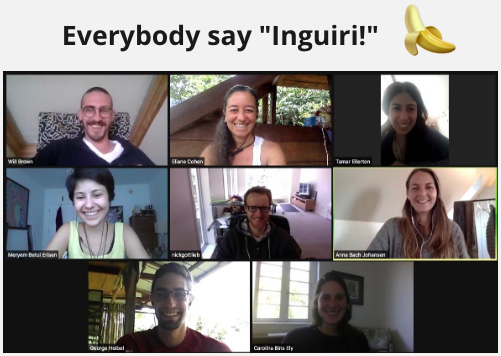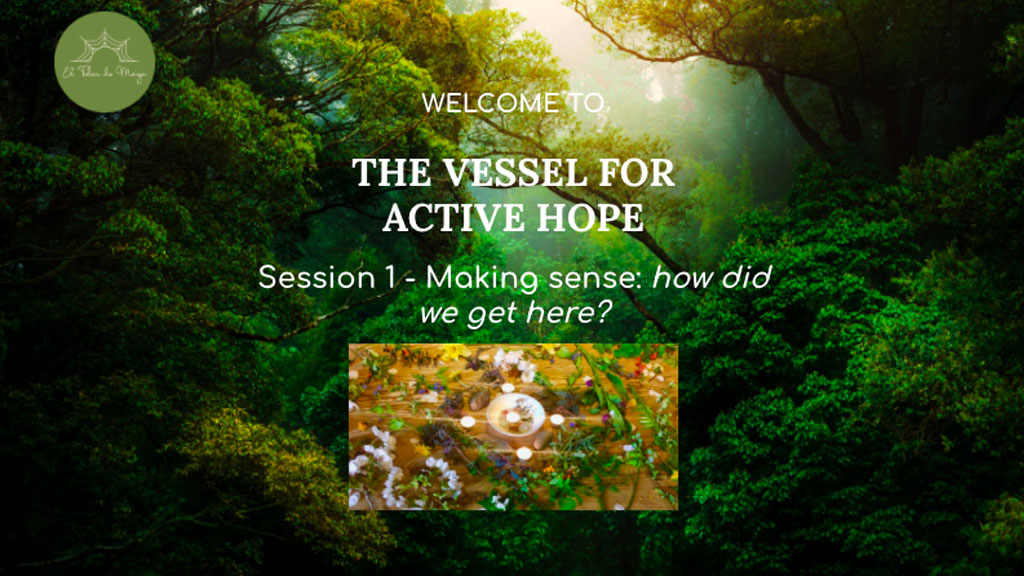Ecological Design Thinking in Practice
April sees the end of taught modules on the Ecological Design Thinking programme. Over the past 7 months, EDT students joined live lectures and discussions, collaborated with and supported each other on group and individual projects and shared experience, resources, poems, music and laughter. During the year that Covid imposed distancing on our social lives, EDT students built an exceptional community with boundaries that stretched from Taiwan to Canada. Whilst lockdown dominated the news, EDT virtually travelled to Shanghai, north and south Italy, Istanbul, Cape Town and coastlines of South West England.
On its first year of low residency, EDT programme proved that community is still an essential part of studying at Schumacher College, even if the members can’t be in the same physical space.
This extraordinary year also brought EDT alumni back to the programme, this time as project providers. 7 years after its inception, there are over 85 motivated EDT students and alumni around the world running and contributing to exceptional projects with themes ranging from land-based learning communities to socio-ecological awareness.
The fourth and last taught module, “Design in Practice”, requires students to engage with external organizations and collaborate on their projects. It is meant to provide an opportunity for students to put the theory into practice. This year, some EDT alumni joined the module and presented their projects to students as placement opportunities. The experience was invaluable for both sides.
The collaboration gave alumni the chance to work with creative people with whom they share language and values. It also gave students experience of working in the filed directly relevant to their study supported by reliable mentors with similar backgrounds.
Here is a glance into some (but not all) of the projects and experiences, as shared by project leads:

Figure 1. Students from 3 EDT cohorts collaborate on Siendo Naturaleza
Siendo Naturaleza (Being Nature) led by Eliane Cohen, is a life project of regenerative learning and living located in the Amazon cloud forest of Peru. Eliane graduated from EDT in 2019 and since then she has hosted students from three cohorts of ecological Design Thinking.
This year, Siendo Naturaleza team hosted four EDT students in an online placement and collaborated in groups on three projects: Exploring frameworks for a pedagogy, Mapping the land’s waste system, Communication and prototyping strategic planning.
Eliane: During our interwoven processes we dived into the context of “life project”, listened deeply, and practiced our facilitation skills. We supported each other’s learning journeys and by creating together felt the power and art of collaboration. This experience invited us to recognize the transformative power of listening, figure out ways to understand the land’s systems virtually, visualize complexity in dynamic ways, understand the meaning of “designing with” and embrace a process-oriented approach.
We celebrate learning from a place of love and are grateful for having had the opportunity to co-create with our peers from Schumacher College.

Carolina: “We were delighted to have Pierre (EDT student) participating in this journey with us, where we aimed to give form to the collective dream that wanted to emerge. Together, we co-designed a process with the participation of alumni from different cohorts of Schumacher College. Then, prototyped a dreaming session in collaboration with sister organization – Siendo Naturaleza (Peru). By the time we implemented the session, we were ready to offer a safe and open space for the Caapora team.
The dream came to life in a space full of happiness, where participants built on each other’s ideas, and a sense of belonging was felt collectively. It was beautiful to see that the fluidity of the overall process gave room to spontaneous collaborations; a joyful process where the bonds created between people let the magic happen.”

Samantha: “Inspired by Joanna Macy’s work, we designed ‘Active Hope Vessel’ a series of 3 workshops. They crafted a virtual environment where activists will find support and inspiration, realign with their purpose, and build courage to change into more holistic alternatives to serve their communities, the marginalised and the living earth. I’m beyond grateful”.
The process started with team- and trust-building exercises, followed by a week of qualitative research. “This beautiful foundation of shared understanding and vulnerability helped to keep us aligned when we found ourselves under pressure towards the end of the project”, says Belinda. “And using intuitive and creative processes made sure we kept the heart of Telar alive in the design”, adds Shazia.
Although social distancing and travel restrictions limited EDT alumni and student collaborations to the virtual world, both groups found the experience rich, fruitful and joyous. We are confident that in the post-pandemic world, the depth of learning and mutual benefit will only increase when the embodied experience of the context and in personal interaction are made possible.
This blog was written and compiled by Dr Mona Nasseri, Porgramme Lead on the Ecological Design Thinking programme at Schumacher College. Find out more about this inspiring programme via this link.
